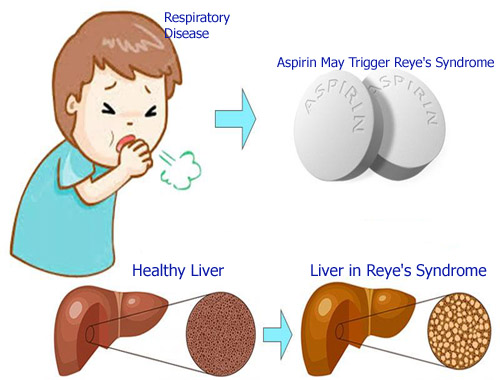Reye Syndrome

Published: 18 Jun 2025
ICD9: 331.81 ICD10: G93.7 ICD11: 8E46
Reye Syndrome is a rare but serious condition that causes swelling in the liver and brain.
It most often affects children and teenagers recovering from a viral infection, such as the flu or chickenpox.
Here's a breakdown of key points:
![]() What it is: A rare, acute (sudden onset) illness that damages the liver and brain.
What it is: A rare, acute (sudden onset) illness that damages the liver and brain.
![]() Who it affects: Primarily children and teenagers, though it can occur in adults.
Who it affects: Primarily children and teenagers, though it can occur in adults.
![]() Cause: The exact cause is unknown, but it's strongly linked to the use of aspirin or medications containing salicylates during recovery from viral infections like the flu or chickenpox.
Cause: The exact cause is unknown, but it's strongly linked to the use of aspirin or medications containing salicylates during recovery from viral infections like the flu or chickenpox.
![]() Symptoms: Reye's syndrome progresses rapidly and can be life-threatening. Symptoms vary but typically include:
Symptoms: Reye's syndrome progresses rapidly and can be life-threatening. Symptoms vary but typically include:![]()

![]() Early symptoms (usually develop a few days after a viral illness):
Early symptoms (usually develop a few days after a viral illness):![]()

![]() Persistent or continuous vomiting
Persistent or continuous vomiting![]()

![]() Lethargy, sleepiness, or confusion
Lethargy, sleepiness, or confusion![]()

![]() Later symptoms (indicate worsening brain swelling):
Later symptoms (indicate worsening brain swelling):![]()

![]() Irritability, aggression, or combativeness
Irritability, aggression, or combativeness![]()

![]() Seizures
Seizures![]()

![]() Weakness or paralysis in the arms and legs
Weakness or paralysis in the arms and legs![]()

![]() Changes in mental status (disorientation, hallucinations, coma)
Changes in mental status (disorientation, hallucinations, coma)
![]() Diagnosis: Diagnosis is based on the patient's symptoms, medical history, and the results of tests such as:
Diagnosis: Diagnosis is based on the patient's symptoms, medical history, and the results of tests such as:![]()

![]() Blood tests (to check liver function and rule out other conditions)
Blood tests (to check liver function and rule out other conditions)![]()

![]() Liver biopsy (to examine liver tissue)
Liver biopsy (to examine liver tissue)![]()

![]() Spinal tap (lumbar puncture) to analyze cerebrospinal fluid
Spinal tap (lumbar puncture) to analyze cerebrospinal fluid![]()

![]() CT scan or MRI of the brain
CT scan or MRI of the brain
![]() Treatment: There is no specific cure for Reye's syndrome. Treatment focuses on supporting the vital functions of the body and reducing brain swelling. This may include:
Treatment: There is no specific cure for Reye's syndrome. Treatment focuses on supporting the vital functions of the body and reducing brain swelling. This may include:![]()

![]() Hospitalization in an intensive care unit (ICU)
Hospitalization in an intensive care unit (ICU)![]()

![]() Monitoring of vital signs (heart rate, blood pressure, breathing)
Monitoring of vital signs (heart rate, blood pressure, breathing)![]()

![]() Medications to reduce brain swelling and pressure
Medications to reduce brain swelling and pressure![]()

![]() Assisted breathing with a ventilator
Assisted breathing with a ventilator![]()

![]() Intravenous fluids and electrolytes
Intravenous fluids and electrolytes![]()

![]() Medications to control seizures
Medications to control seizures
![]() Prevention: The most important step in preventing Reye's syndrome is to avoid giving aspirin or products containing salicylates to children and teenagers when they have a fever or symptoms of a viral illness. Always read medication labels carefully and consult with a doctor or pharmacist if you have any questions.
Prevention: The most important step in preventing Reye's syndrome is to avoid giving aspirin or products containing salicylates to children and teenagers when they have a fever or symptoms of a viral illness. Always read medication labels carefully and consult with a doctor or pharmacist if you have any questions.
Important Note: If you suspect that a child or teenager may have Reye's syndrome, seek immediate medical attention. Early diagnosis and treatment are crucial to improving the chances of recovery.